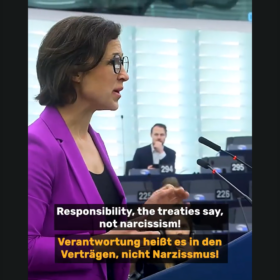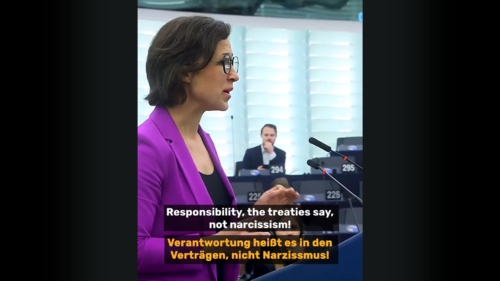In between 1992 and 2019, on average, only 13 percent of negotiators were female, despite studies showing that women's participation increases the chances of achieving sustainable peace and leads to agreements that contain more provisions that benefit women and men equally.
Quelle: Auswärtiges Amt
It is the 28th of February 2022: A few days ago, Putin’s troops invaded Ukraine and started a war of aggression – now the delegations from Russia and Ukraine are negotiating. At the negotiating tables: Only men.
This picture is not an exception: Only 6% of the signatories of peace treaties are women. After all, the negotiations are mostly conducted by those who want to enforce their interests by force of arms – in other words: men.
Putin can safely be described as peak toxic masculinity and yet he is far from being alone with his macho behaviour and his oppression of women and minorities in his own country. With Ukraine, this aggression is also directed at a whole country. The extent to which misogyny and fantasies of imperial power are connected can be seen in the way Putin talks about Ukraine.
But how can a feminist foreign policy counter all this?
A feminist foreign policy does not only aim to advance gender equality, promote women and defend their human rights: A feminist foreign policy puts the safety of people first.
You are currently viewing a placeholder content from X. To access the actual content, click the button below. Please note that doing so will share data with third-party providers.
More Information
You are currently viewing a placeholder content from X. To access the actual content, click the button below. Please note that doing so will share data with third-party providers.
More InformationWe have become far too dependent on Putin's Russia
The concept of security, which in traditional foreign policy only encompasses military and nation-state security, is thus expanded, toxic masculinity and patriarchal structures are no longer accepted in international relations.
It is exactly this domain which has been neglected in foreign and security policy in recent years and decades, as I made clear in an interview with the Tagesschau (German news service). At the same time, we have become far too dependent on Putin’s Russia – this is now backfiring on us.
Could we have prevented this war with a feminist foreign policy? This is impossible to say. But one thing is clear: More female participation in our foreign policy would lead to a less violent world – I also pointed that out in an interview with the German public broadcasting service WDR (no longer available online). Especially in these times of crisis, we must strenuously pursue a feminist foreign policy in order to counteract men like Putin.
To build lasting peace in Ukraine, women and all those who have suffered from the conflict should be at the negotiating tables and be included in peace-building measures.
Putin’s Russia is currently largely isolated on the world stage – this was shown by the UN resolution on the war in Ukraine, which was adopted with an overwhelming majority.
Yet military aggression is still seen by many as a legitimate tool of policy-making in our world. A feminist foreign policy does not turn a blind eye on this. But it seeks to change this reality.












